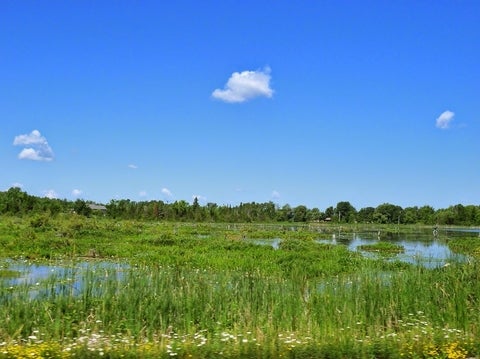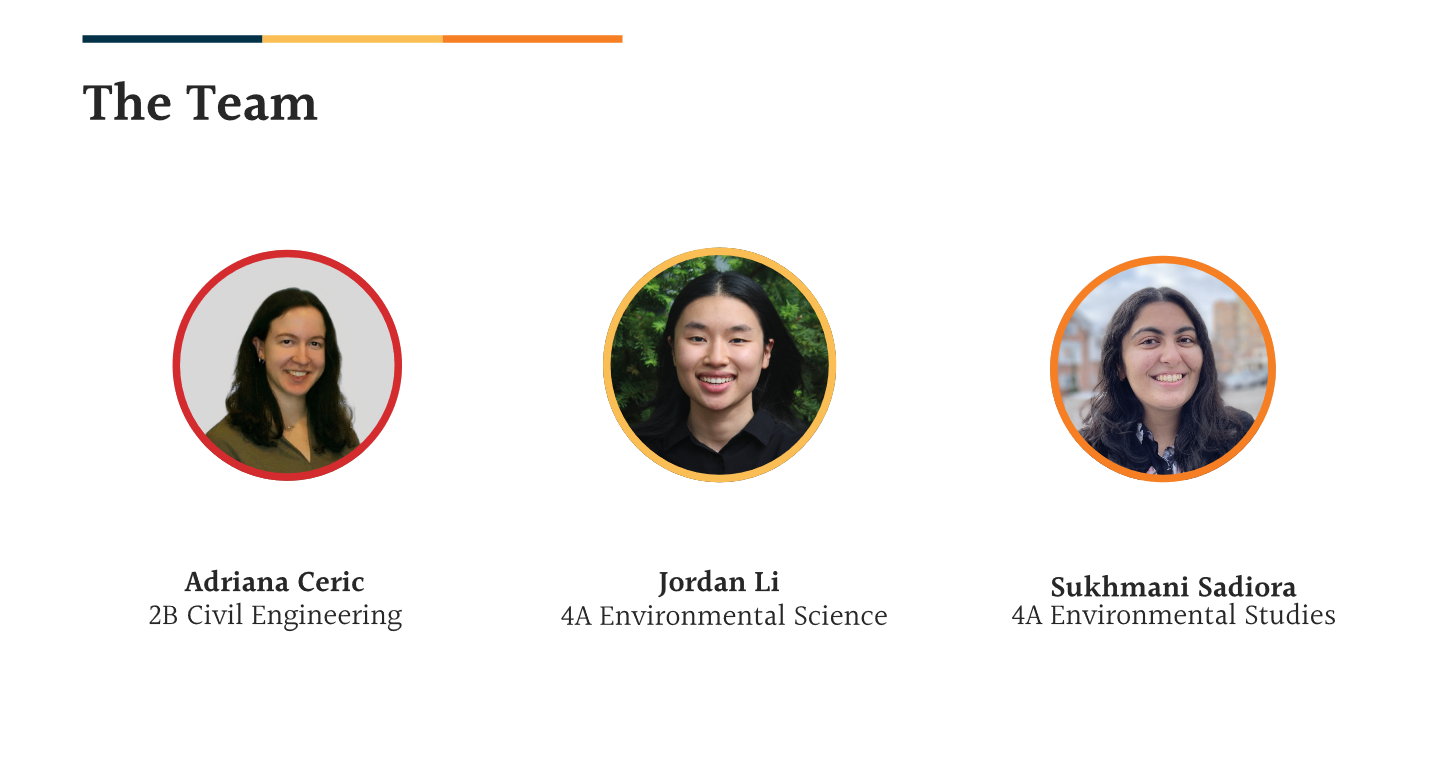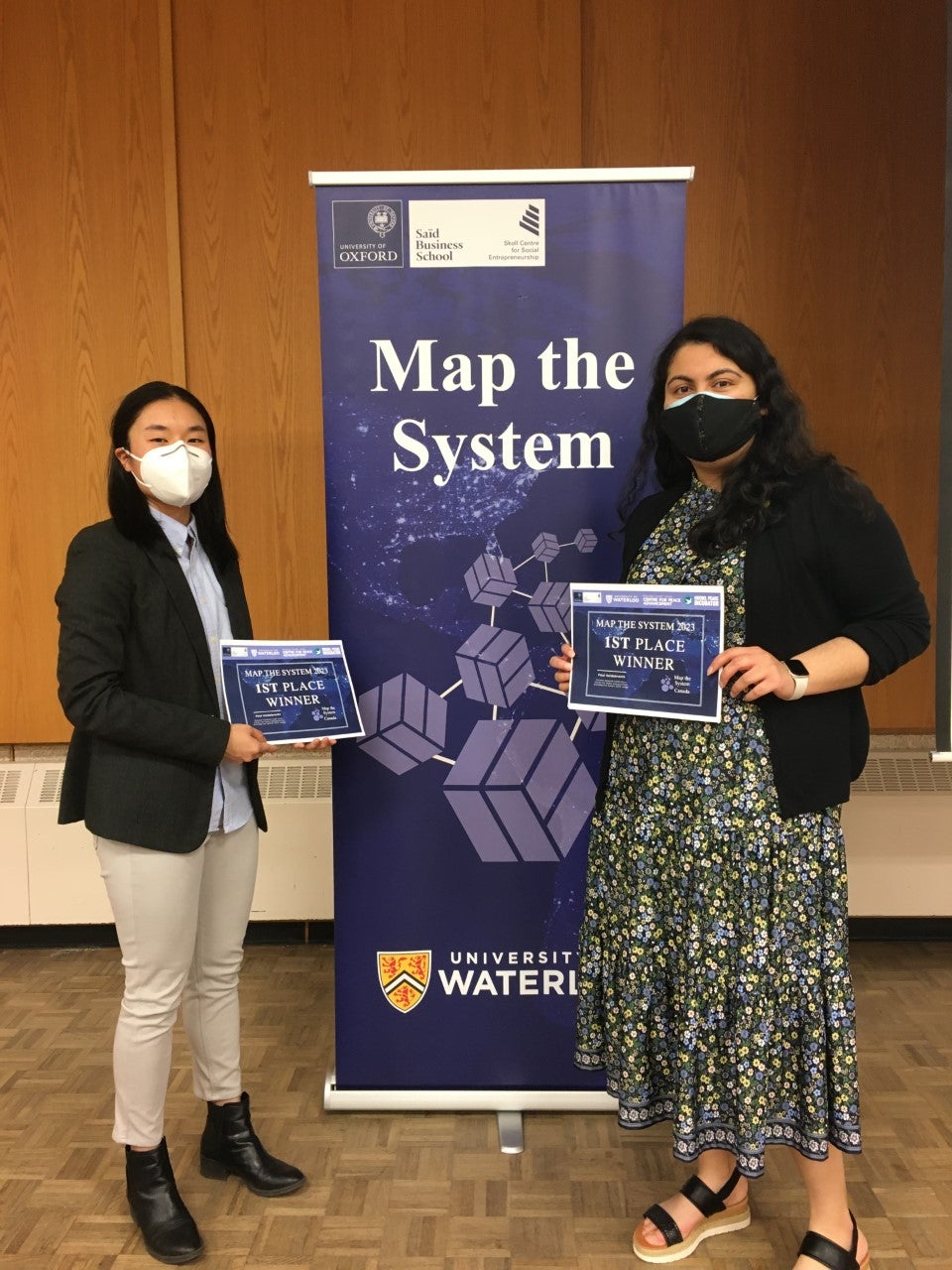
Mapping systems in Canada and beyond
by: Joey Ou
“I have come to appreciate the power of bringing together diverse viewpoints and expertise from various disciplines to tackle complex problems effectively,”
Map the System is a global competition developed by the Skoll Centre for Social Entrepreneurship at Oxford University that includes several stages. The winning team from this year’s University of Waterloo campus finals, composed of Adriana Ceric, Jordan Li, and Sukhmani Sadiora, competed in the Canadian regional finals on May 12th, 2023, where they presented their research about Wetland Management in the Regional Municipality of Durham, Ontario. While they were not selected to progress to the Global Finals at Oxford in July, this does not mean that their journey is over. Joey Ou, the Centre for Peace Advancement’s Program Assistant, interviewed the team members to learn about their motivations and challenges, their experience in Map the System 2023, and what might come next.

Before joining the Map the System competition, the team members already had exposure to the topic of wetlands management through their coursework and job experiences. Jordan said, “Personally, I had the opportunity to delve into the study of wetlands in Southern Ontario during the previous spring, and in the term leading up to the competition, I further expanded my knowledge through various courses focusing on wetlands and urban water management.” Sukhmani and the team noticed that “the urgency surrounding wetland management has picked up during our undergrad, but also how it has aligned with the province pushing for more and more development.” They were particularly concerned about the potential impacts of Bill 23, known as the “More Homes Built Faster Act, 2022,” which aims to accelerate the construction of residential properties across the province. The students understood the importance of preserving wetlands and realized that this legislation could have detrimental effects on these valuable ecosystems. Through research, they discovered that the Regional Municipality of Durham would be an ideal case study to focus on.
One of the challenges the team encountered was their limited experience with systems thinking. They had to learn and apply systems thinking approaches to map out the complex wetland management system. According to Jordan, “We had to consider numerous conventions while creating our visual map, which added to the complexity.” Another challenge was narrowing down the scope. “It can be difficult when there is so much you can explore with a given topic,” said Sukhmani. “Thankfully, our mentors, Elham Mohammadi, and Paul Heidebrecht, provided invaluable guidance in helping us navigate the initial analysis of our system.” said the team.
Although the team did not make it to the Global Finals, they expressed gratitude for the learning experience. The competition provided a deeper understanding of wetland management and system thinking. They acknowledged the need for better environmental messaging and media and recognized their roles as students in promoting awareness and understanding. Sukhmani said, “There was a lot of frustration initially. I was really frustrated that we did not get to explain our topic more, but I feel okay about it all now. It taught me that we have a long way to go in terms of environmental messaging and media, and as a student, that is something I can still apply.”
The team members had specific advice to share with future Map the System participants. For example, they recommended emphasizing the importance of their chosen topic through personal connections and primary research. Jordan said, “Something we didn’t realize until we were further into the competition is that value of using primary research and first-hand accounts to really support our topic.” Additionally, they suggested creating draft maps as students' progress in their research and considering drafting the report alongside the map creation process to ensure better integration of ideas. Sukhmani said, “Looking back on it, it might have been helpful for us to write our report in conjunction with creating our map.”
Jordan and Sukhmani also shared their plans for the future regarding wetland management. Jordan expressed her intention to continue exploring wetlands academically through her co-op experience focused on researching nutrient loading in restored wetlands. Sukhmani, currently involved in a wetland restoration project, expressed interest in volunteering for wetland projects and further research, acknowledging that this experience has opened a door for her.
Participating in Map the System helped refine the team’s thinking and their appreciation of collaboration. “This opportunity has highlighted the significance of being interdisciplinary in my thinking and collaborations with others,” said Sukhmani. They also emphasized the need for better communication and open-mindedness in tackling environmental issues: “This project has given me a better appreciation of just how many perspectives are involved in an issue like this, and that there isn’t always an easy solution."

For the team, the project was not just an entry into the competition but part of their ongoing work. Jordan and Sukhmani will persist in their pursuits in environmental science and wetland management, while Adriana seeks opportunities in transit or housing development. They plan to share their project analysis with individuals and groups within the university, further spreading awareness about wetland management.
The Map the System competition gave the team valuable insights and a broader understanding of wetland management. They highlighted the significance of participating in such events to challenge assumptions, gain new insights, and expand existing knowledge. The experience fostered mutual learning among teammates with diverse perspectives and backgrounds, enhancing their ability to combine engineering, policy, and science knowledge.
By exploring the topic of wetland management, the team members are determined to make a positive impact on their community and beyond and help pave the way for a more sustainable future.
Stay tuned on our twitter and LinkedIn for opportunities to follow the progress of the Canadian universities who made it to the global finals from July 4th to 9th. Also, if you are a student and are interested in competing in the Map the System 2024, watch for details on how you can get involved in the Fall of 2023. In the mean time take a look at our website for details about the Map the System 2023.